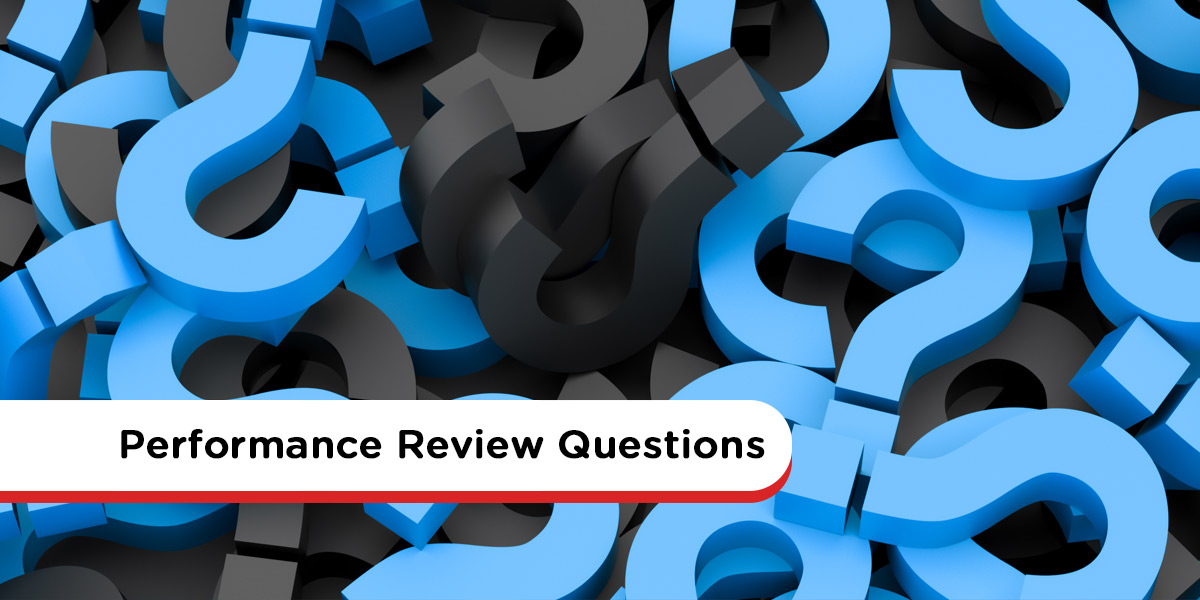
Your New Intranet Starts Here
Streamline communication, boost collaboration, and empower your team with MyHub's intuitive intranet solution.
Book a live demo now and experience the difference.
Take a Quick TourLove ’em or hate ’em, performance reviews are still one of the main tools for getting the best out of your people. These days, effective employee appraisals go beyond evaluating performance – they explore motivation, productivity, and overall well-being. When conducted thoughtfully, reviews positively influence employee engagement, workplace culture, and company-wide productivity. So, what’s the key to a successful performance appraisal? It starts with asking the right questions. The golden rule is to keep questions specific and limited in scope. Below, we share 100 smart performance review questions to inspire time-pressed managers or those unsure where to start.
We’ve categorized the questions into topic areas for convenience. We don’t recommend using all 100 – that would be overwhelming for both you and your employee. Instead, pick and mix the ones that best suit your business needs. Topics covered include the following essential aspects of employee performance:
- Overall employee performance
- Employee strengths
- Areas for improvement
- Company culture and teamwork
- Behavioral review
- Motivation and drive
- Manager-employee relationships
- Professional development and future goals
Let’s be honest – many employees breathe a sigh of relief when the performance review is over. If that’s you, you’re not alone. Research from Gartner shows that 59% of workers believe appraisals have no real impact on their performance. Even more surprising: 1 in 5 employees would rather call in sick than attend one. But it doesn’t have to be this way. The secret to a successful review lies in asking the right performance review questions.
Appraisals offer a chance for meaningful conversations about your role, aspirations, and career path. They provide a strategic roadmap for personal growth and, in some cases, may even open doors to a promotion or pay increase.
Last week, we shared 65 performance review questions every manager should ask. This time, the spotlight is on employees. These questions are valuable for staff at every level and help make the review a two-way dialogue – not just a one-sided evaluation.
We’ve divided the questions into two categories. First, you’ll find questions to ask yourself as you prepare for the review. Then, we cover questions to ask your manager during the session to ensure you get the most out of the experience.
What Happens In A Performance Appraisal?
In many organizations, performance reviews are held annually. Others conduct them bi-annually or even quarterly for more frequent feedback loops.
These one-on-one meetings between you and your manager focus on evaluating your strengths, achievements, and areas for improvement. It’s also your chance to raise work-related concerns and explore training opportunities.
After the review, your manager will document the discussion, including any performance goals and future targets.
That’s why performance review questions are important.
Your performance review should be viewed as a learning opportunity. Don’t just passively listen to feedback – be an active participant. Proactively researching professional development opportunities or online courses to improve your technical or soft skills can show initiative and increase your chances of getting support from your manager.
Preparation is essential to make the most of your performance review. The following set of questions will help you reflect and prepare in advance.
Employee Review Opening Questions
Start the review on the right note with these warm, open-ended questions, before jumping into the performance review questions. The goal is to create a comfortable, collaborative atmosphere.
- How are you today?
- Is there anything you would like to share before we get started?
- How do you prefer to receive feedback – email, face-to-face, or via business IM?
- Do you feel that I’ve provided you with enough constructive feedback this year?
- What are your personal goals and aspirations for the upcoming year?
Overall Employee Performance
These performance review questions are designed to help assess the employee’s overall contribution and how aligned their efforts are with business goals.
- Since our last review, what’s been the achievement you are most proud of, and why does it stand out to you?
- Can you share 3-5 key contributions you’ve made that have positively impacted the company or your team?
- How have these accomplishments supported our wider organizational goals and strategic objectives?
- Let’s revisit the goals we set in your last performance appraisal. Which ones were unmet, and what were the contributing factors?
- Do you feel you currently have access to all the tools and resources necessary to perform at your best?
- If not, what specific obstacles or limitations are preventing your success?
- Is there anything I can do as your manager to provide better support or remove blockers?
- What types of tasks have you enjoyed the most this year, and why?
- Looking ahead, what would you like to approach differently next year, and what outcomes do you expect from those changes?
Employee Strengths
Performance appraisals are an ideal moment to recognize employee strengths. Performance review questions should build on that. Encouraging reflection on what they do well provides managers with a better understanding of hidden talents and untapped potential.
- Which of your core strengths do you believe are most critical to your success at work?
- Are there any additional ways we could leverage your skills and expertise within the company?
- What specialized knowledge or experience do your co-workers rely on you to provide regularly?
- Which parts of your role do you feel most confident and competent in?
- What existing strengths would you like to enhance further over the next 12 months?
Areas for Improvement
Whether you’re a team leader or new hire, everyone has areas for performance improvement. This section of your appraisal encourages self-reflection and growth. With the right guidance, these discussions can foster development rather than discouragement. Remember, constructive feedback drives better results, while destructive criticism does the opposite. Try out these performance review questions:
- What are some specific areas where you feel improvement is needed?
- Which 23 key focus areas would make the biggest impact on your performance?
- What kind of support or coaching would help you achieve this?
- Which goals or deliverables this year are you least satisfied with, and why?
- Are there any ongoing challenges or concerns related to your role or team collaboration?
- What elements of your job do you find most challenging or frustrating?
- If you could change one aspect of your current role, what would it be and how would it improve your work?
Company Culture and Teamwork
Strong company culture and effective teamwork are key drivers of performance and retention. These questions explore how well employees align with company values and function within teams. What do you think of these performance review questions?
- Which of our core company values do you feel you’ve embodied the most over the past year?
- What do you believe are the primary drivers of company success?
- Can you describe how your efforts have contributed to these outcomes?
- How has management support either enabled or hindered your work this year?
- Do you feel connected to and comfortable with our company culture?
- Do you have any actionable suggestions for improving the workplace culture?
- How would you assess the current level of team collaboration?
- If collaboration isn’t optimal, what are the key roadblocks, and how might we overcome them?
- What changes could make our team meetings more engaging and productive?
- Would you feel confident recommending our company as a great place to work to your peers or friends?
- How have your actions supported or driven the achievement of corporate goals this year?
Behavioral Review
This section looks at the employee’s behavior and problem-solving skills during day-to-day tasks and projects. These questions provide insights into how team members communicate, collaborate, and adapt in challenging situations. You should keep these performance review questions in mind:
- Let’s talk about your biggest accomplishment this year. What helped you achieve success, and what obstacles did you overcome?
- Reflecting on your biggest setback, what would you do differently today? Could your manager or colleagues have supported you better?
- Describe a time when you disagreed with a colleague or manager. How did you present your viewpoint and handle the situation?
- What was the resolution, and what did you learn from that experience?
- Which tasks or projects were more challenging than expected, and how did you deal with those difficulties?
- What was the most valuable feedback, training, or mentoring you received this year, and why was it impactful?
Motivation
Understanding employee motivation is essential for enhancing workplace productivity and job satisfaction. This section of questions helps uncover what inspires your team member to perform at their best. These performance review questions will help you finding the right words.
- What drives you to give your best performance?
- What motivates you to keep coming to work every day?
- What aspects of the company’s work are you most passionate about?
- Which parts of the job do you enjoy the most and why?
- What are the ideal working conditions for you to maximize your productivity?
- How do you prefer to be recognized for your contributions?
- What types of rewards encourage and motivate you to do a good job?
Manager-Worker Relationships
Positive relationships with managers are a cornerstone of employee retention and satisfaction. These questions aim to strengthen communication and provide insights into how management can better support staff. The following performance review questions are on point doing so.
- When it comes to completing your work, what do I do is most helpful?
- And what is the least helpful?
- Name two or three things that I could do differently to better support you.
- Do you have any suggestions on how we can improve our working relationship?
- Have you got any concerns about the feedback I have provided?
- If so, how can I address those concerns?
- Thinking about executive leaders, how has management helped or hindered your job?
- What would you do differently to improve teamwork if you were a manager?
Worker Outlook And Professional Development
Performance reviews are an ideal time to evaluate an employee’s career outlook and their aspirations for growth. Use these questions to discuss personal development and how it aligns with company goals. Check out these performance review questions:
- What are your personal and professional goals for next year?
- How are your goals aligned with company objectives?
- What do you see as your biggest challenge, and what are you doing to prepare?
- How do you see your career progressing within the company?
- What development opportunities will help you get there?
- What support do you need from the company or me to improve your performance?
- What professional development opportunities did you get the most benefit from this year?
Questions To Ask Yourself In Preparation For Performance Appraisals
Self-reflection is key to making your performance appraisal productive. Prepare by asking yourself honest questions that reveal your accomplishments, growth areas, and future direction. We’ve listed a couple of performance review questions helping you out.
- What successes at work am I most proud of?
- How well did I meet my goals and targets this year?
- What goals have I fallen short on, and why?
- In what areas has my performance been strongest?
- What parts of the job do I enjoy the most?
- What aspects of my work are the least enjoyable, and why?
- With the benefit of hindsight, are there any things I would do differently, and why?
- What skills make me effective in my current role?
- What three areas would I like to develop my skills in over the next year?
- What do I want my next position in the company to be?
- What skills and knowledge do I need to develop to get there?
- What is the company value that I lived up to the most? What examples can I give?
- What are my short- and long-term career goals?
- Could management do more to support me in my work? If so, how?
- Moving forward, how could my manager help me improve my performance?
Questions For Your Boss
You’re prepared with examples, goals, and a positive attitude. Now, make your performance review a two-way conversation. Actively listen, reflect, and don’t hesitate to ask your manager the following questions to gain clear insights into expectations and areas for growth.
Performance Review Questions Employees Should Ask During A Performance Review
- Has my performance met your expectations?
- How do you keep track of my progress?
- What do you think are my main strengths?
- And what are my weaknesses?
- How can I improve on those areas of weakness?
- What goals do I need to focus on next year?
- Am I directing my time and efforts on the right areas of the job?
- Are there any areas I should spend more time on?
- How can I contribute to the team’s success?
- What can I do to better support my co-workers?
- Are there any skills I need to work on to grow in the company?
- Is there any opportunity for growth within the business?
- What would make me a good candidate for a company promotion?
- What’s on the horizon for the company next year?
- What are the biggest challenges facing the business right now?
- What opportunities are there for me to grow my skills with professional development?
- What mentorship is available to help me better perform my role?
- Can we discuss my compensation?
- Is there any possibility of a pay raise?
- How can I help to make your job easier?
Tips For Managers On Conducting Employee Appraisals
Armed with a comprehensive set of performance review questions, you are almost ready to conduct a productive appraisal. However, the following tips for managers will help ensure your review meeting is successful, constructive, and valuable for both you and your employee.
- Prepare in advance. Being ill-prepared for a performance review is a sure way to undermine its effectiveness. Block out time in your calendar to review last year’s appraisal notes and jot down key areas you want to cover, focusing on employee development and actionable goals.
- Set aside enough time for the appraisal interview. Provide your employee with sufficient notice so they can prepare thoughtfully. Schedule ample, uninterrupted time to allow a thorough, meaningful discussion.
- Keep it informal. Consider hosting the review away from the main office in a comfortable, private setting. A quiet meeting room or relaxed environment can help ease nerves and encourage honest dialogue.
- Keep a record. Document key points, feedback, and agreed-upon targets. Share these notes with the employee afterward to ensure mutual understanding and accountability.
- Make it goal-oriented. Ensure the employee understands what is expected by setting clear, measurable SMART goals. Follow up regularly to track progress and adjust as needed.
- Keep it balanced. Highlight both strengths and areas for improvement to provide constructive, fair feedback that motivates and inspires growth.
- Invite feedback on your own performance. Use the appraisal as an opportunity to learn how you can improve as a manager. Ask your employee for honest insights and use them to enhance your leadership skills.
Performance Review Example Phrases
Struggling to get started with writing a performance review after your appraisal discussion? We can help!
Explore our dedicated blog featuring 100 useful performance review example phrases. These phrases are grouped by key skills, attributes, and common performance issues across many roles. Whether you need positive reinforcement or constructive criticism examples, you’ll find customizable phrases to tailor to your team members’ unique situations.
Employee Performance Reviews: Next Steps
The end of the performance review conversation should not mean the end of the process. Your manager will provide a written record of outcomes and your personal performance targets. Follow-up is essential to ensure the review drives real progress and isn’t just a tick-box exercise.
If your organization lacks a formal follow-up system, be sure your appraisal outcomes are regularly reviewed during your one-to-one meetings. This makes your manager accountable for commitments, including professional development support. It also serves as an early-warning mechanism if any issues arise affecting your performance, allowing you to address them promptly and avoid surprises in your next annual review.
Final Thoughts
Rather than approaching your annual review with dread or anxiety, view it as an invaluable opportunity. It’s a chance to have your manager’s full attention, showcase your achievements, and gain clear insights into your performance and expectations.
This is also the ideal moment to discuss your career future, ask for guidance, and identify the steps you need to take to reach your professional goals. Although employee performance reviews may not be perfect, asking the right questions will ensure continuous professional growth, development, and potentially lead to a promotion or salary increase.
Want to learn more? Check out our blog on the Top 8 Performance Review Tips For Employees. Plus, download our handy performance review checklist to help you prepare thoroughly and confidently.
About MyHub Intranet Solutions
MyHub’s out-of-the-box intranet solutions are designed by experts with the non-expert in mind. Our cloud-based intranet platforms are trusted by businesses worldwide to improve team collaboration, communication, and employee engagement, driving more efficient and effective operations.
Discover why independent reviewers consistently rate MyHub highly by signing up for a free demo or 14-day trial today.
FAQ Section
Why are performance review questions important?
Performance review questions guide meaningful conversations between employees and managers. They ensure feedback is specific, balanced, and tied to growth and performance outcomes.
How should I prepare for a performance review as an employee?
Reflect on your goals, achievements, and challenges from the past period. Think about areas where you’d like to grow, and prepare a few thoughtful questions to ask your manager about your future in the company.
How often should performance reviews be conducted?
While many companies still follow the annual review model, quarterly or bi-annual reviews are becoming more popular to promote continuous feedback and timely course corrections.





